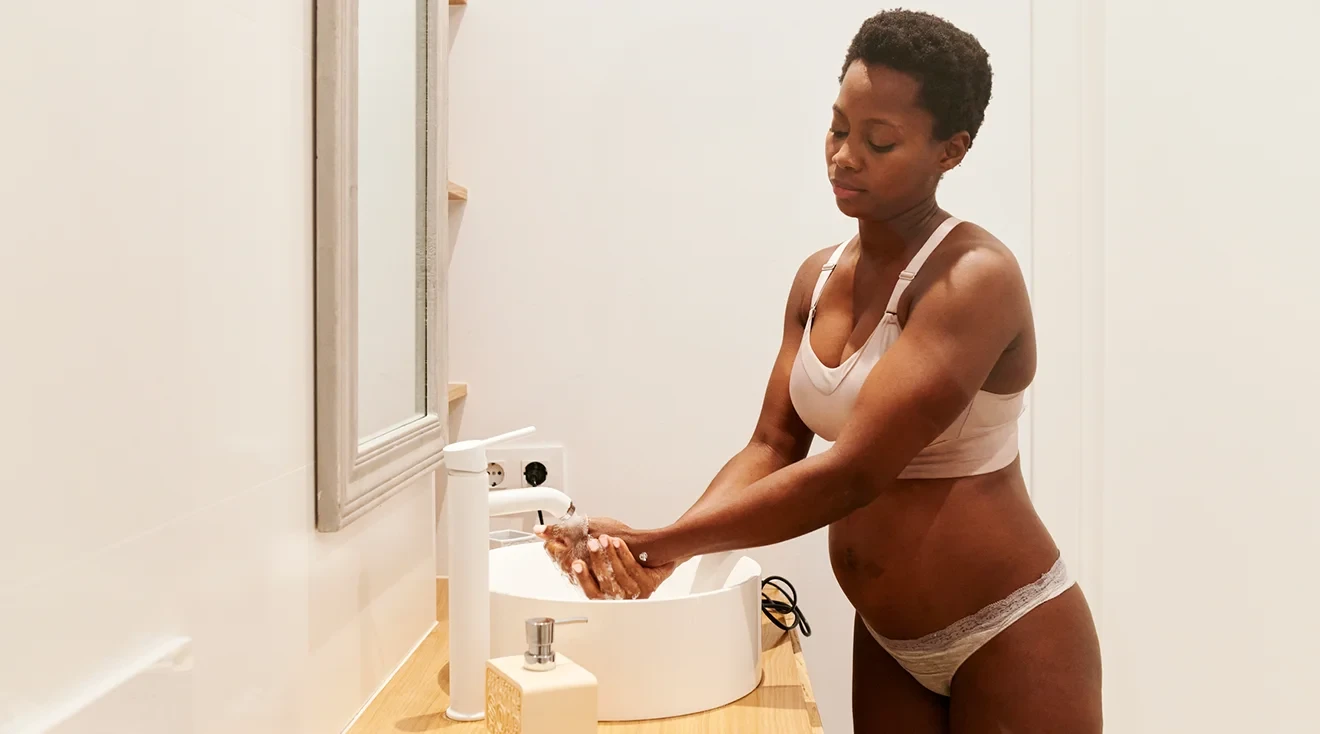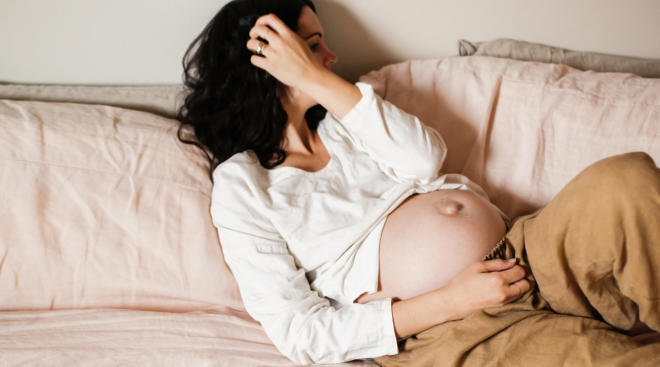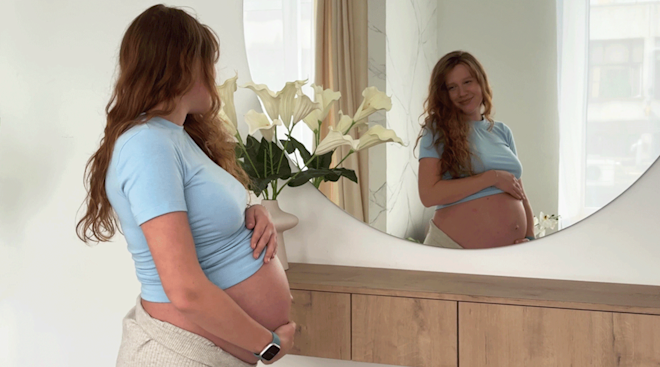What to Do for Painful Urination During Pregnancy
During pregnancy, it’s very normal to need to use the restroom many, many times a day. In fact, you’ll probably experience frequent urination almost from the very beginning of your pregnancy—but that doesn’t mean it should be painful. We can all agree that there isn’t a lot that’s super-comfortable while expecting, but painful urination during pregnancy could signal a problem. Luckily, it’s a pretty easy fix, especially if your pain when peeing during pregnancy points to a urinary tract infection (which up to 7 percent of pregnant women experience). Keep reading to learn everything you need to know about painful urination during pregnancy, including why it happens, what the hidden cause is and how to handle it.
When it comes to peeing during pregnancy, frequent is fine—but pain is a problem. “Urination should never be painful,” says Sarah Prager, MD, a professor in the department of obstetrics and gynecology at the University of Washington. While there are a number of causes related to pain when peeing while pregnant, the most common by far is a urinary tract infection (UTI). “UTIs are more common during pregnancy due to both hormonal changes causing the urinary tract to relax, as well as mechanical changes caused by the enlarging uterus,” says Alan Fishman, MD, a maternal-fetal medicine specialist with Obstetrix Medical Group of San Jose in California.
If you’re experiencing painful urination during pregnancy, know that the following conditions can lead to a UTI, or they can be an underlying cause of bladder pain and painful urination during pregnancy.
Bacterial vaginosis
Bacterial vaginosis is a common condition caused by an imbalance in the normal bacteria that lives in the vagina. It can cause painful urination due to inflammation of the immediate area, or by spilling bacteria into the urinary tract, which can lead to a UTI.
Sexually transmitted infections
Any undiagnosed sexually transmitted infections can cause painful urination during pregnancy as a result of inflammation. “STIs can cause pain, usually pelvic but sometimes vaginal, or even painful urination. This is why pregnant women are screened for STIs at the beginning of pregnancy,” says Fishman.
Genital herpes
Herpes can cause painful urination, whether you’re pregnant or not. But unfortunately, this painful condition can cause extra complications during pregnancy. If you know you have herpes, it’s critical to follow your doctor’s advice in order to keep active infections at bay, especially as you approach your due date.
Mechanical obstruction
As your uterus grows to several times its normal size during pregnancy, it can put a (literal) squeeze on everything else in there. That includes the ureters, which are the ducts from the kidney to the bladder that urine passes through, says Brittany Robles, MD, an ob-gyn who runs PostpartumTrainer.com, a pregnancy and postpartum health and fitness site. When urine gets left behind in the ureters because it’s physically difficult to properly empty them, “this causes a condition known as urostasis,” Robles says. “That can lead to persistent bacterial growth and ultimately a urinary tract infection.”
Pain when peeing while pregnant isn’t normal and usually points to a problem. It’s important to see your doctor if you’re experiencing either painful urination or bladder pain during pregnancy. The underlying problems are usually quickly resolved with treatment, but if left untreated they can become dangerous for you and baby. “Untreated urinary tract infections are associated with pregnancy complications such as preterm labor and preterm delivery. They can also cause kidney damage or sepsis in pregnant women,” says Fishman.
If it’s an undiagnosed or untreated STI that’s causing your painful urination, that can also be harmful to both you and baby. According to the CDC, if left untreated, chlamydia and gonorrhea during pregnancy can cause preterm labor, low birth weight and have been linked to miscarriage. They can also be passed onto baby at birth through the birth canal, potentially resulting in eye and lung infections. While this all sounds scary, rest assured that if you alert your doctor to any painful urination during pregnancy in a timely manner, the problem can generally be quickly and safely resolved.
See your doctor at the first sign of painful urination, Prager says. Your doctor will probably prescribe antibiotics, especially if it turns out you have a UTI. The reason? “UTIs can become kidney infections or worse, so we’re relatively aggressive about treating them during pregnancy,” Prager says.
This is likely also the same course of action your doctor will take if it turns out you have an STI: antibiotics can clear up many infections pretty quickly, so don’t be embarrassed about speaking up. After all, nothing is more important than your health and baby’s!
Pregnancy brings many aches and pains, and you likely don’t want to add pain when peeing to the list. So how can you prevent painful urination during pregnancy? “Adequate hydration is the best thing you can do to help prevent UTIs during pregnancy,” says Fishman. “This has the beneficial effect of increasing urinary production and flow and flushing the kidneys.” Strive to meet or even exceed the recommended eight cups of water daily. Other ways to prevent UTIs include:
- Don’t hold in your urine
- Always wipe from front to back to prevent bacteria from entering into the vagina
- Empty your bladder before and after sex
- Wear breathable cotton underwear
In order to prevent STIs during pregnancy, the CDC recommends:
- Reducing your number of sex partners and getting regularly tested
- Correctly using condoms during all types of sex
Of all the aches and pains you may experience, painful urination during pregnancy is relatively easy to solve. The most important thing is to speak with your doctor in a timely manner if you’re experiencing any pain, so they can ensure both you and baby stay healthy.
About the experts:
Sarah Prager, MD, MAS, is a professor in the department of obstetrics and gynecology at the University of Washington and director of the family planning division. She received her medical degree from the University of Texas Southwestern Medical School in 2000 and completed an internship and residency at the University of Vermont.
Alan Fishman, MD, is the medical director for Obstetrix Medical Group of San Jose in Campbell, California, and is double board-certified in obstetrics and gynecology, as well as maternal-fetal medicine. He received his medical degree from Jefferson Medical College in Philadelphia, Pennsylvania, and completed his ob-gyn residency and maternal-fetal medicine fellowship program at University of Southern California, School of Medicine in Los Angeles.
Brittany Robles, MD, MPH, CPT, is an ob-gyn and NASM-certified personal trainer who runs PostpartumTrainer.com, a pregnancy and postpartum health and fitness site. She earned her medical degree from Ross University School of Medicine and received her master’s degree in global health from Icahn School of Medicine at Mount Sinai.
Please note: The Bump and the materials and information it contains are not intended to, and do not constitute, medical or other health advice or diagnosis and should not be used as such. You should always consult with a qualified physician or health professional about your specific circumstances.
Plus, more from The Bump:
Navigate forward to interact with the calendar and select a date. Press the question mark key to get the keyboard shortcuts for changing dates.




















































